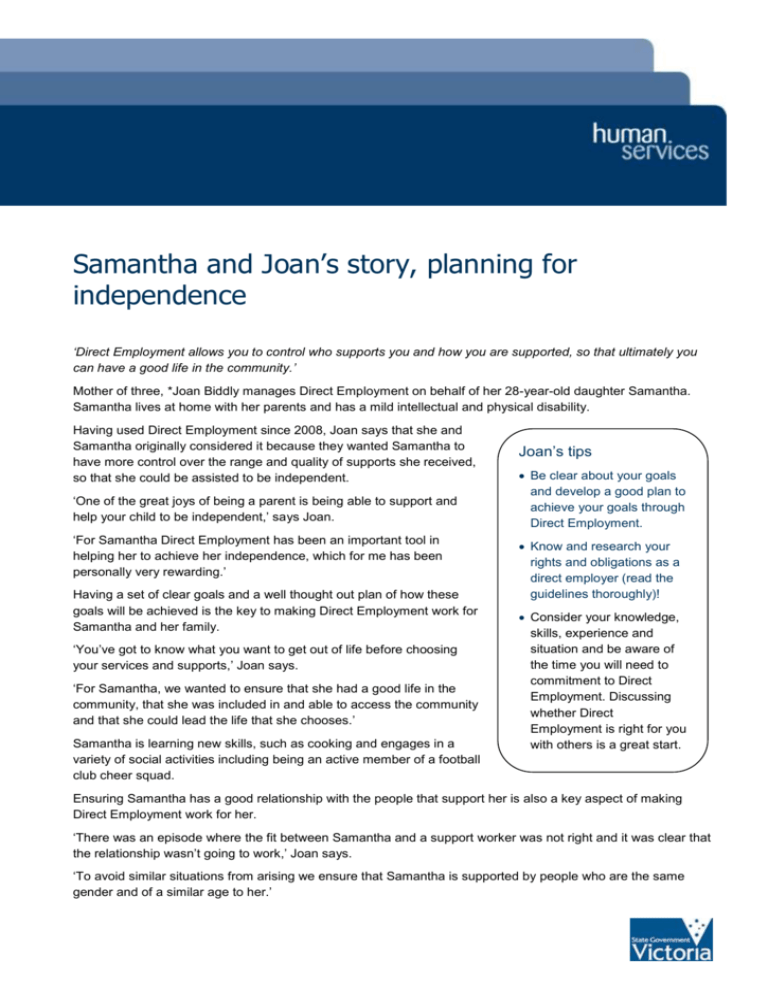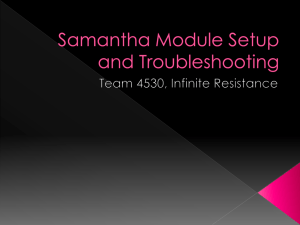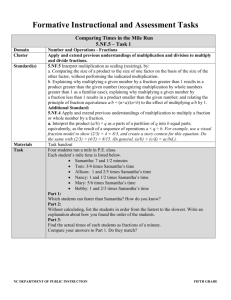Samantha and Joan`s story - Planning for independence
advertisement

Samantha and Joan’s story, planning for independence ‘Direct Employment allows you to control who supports you and how you are supported, so that ultimately you can have a good life in the community.’ Mother of three, *Joan Biddly manages Direct Employment on behalf of her 28-year-old daughter Samantha. Samantha lives at home with her parents and has a mild intellectual and physical disability. Having used Direct Employment since 2008, Joan says that she and Samantha originally considered it because they wanted Samantha to have more control over the range and quality of supports she received, so that she could be assisted to be independent. ‘One of the great joys of being a parent is being able to support and help your child to be independent,’ says Joan. ‘For Samantha Direct Employment has been an important tool in helping her to achieve her independence, which for me has been personally very rewarding.’ Having a set of clear goals and a well thought out plan of how these goals will be achieved is the key to making Direct Employment work for Samantha and her family. ‘You’ve got to know what you want to get out of life before choosing your services and supports,’ Joan says. ‘For Samantha, we wanted to ensure that she had a good life in the community, that she was included in and able to access the community and that she could lead the life that she chooses.’ Samantha is learning new skills, such as cooking and engages in a variety of social activities including being an active member of a football club cheer squad. Joan’s tips Be clear about your goals and develop a good plan to achieve your goals through Direct Employment. Know and research your rights and obligations as a direct employer (read the guidelines thoroughly)! Consider your knowledge, skills, experience and situation and be aware of the time you will need to commitment to Direct Employment. Discussing whether Direct Employment is right for you with others is a great start. Ensuring Samantha has a good relationship with the people that support her is also a key aspect of making Direct Employment work for her. ‘There was an episode where the fit between Samantha and a support worker was not right and it was clear that the relationship wasn’t going to work,’ Joan says. ‘To avoid similar situations from arising we ensure that Samantha is supported by people who are the same gender and of a similar age to her.’ ‘The finances and all that, you can make it as hard as you want it to be, or you can set up a very simple system from the start,’ Joan says. This ‘simple system’ involves Samantha collating timesheets that are filled and signed by her support workers and then stored on a central file. The amount each worker is paid is then calculated based on their timesheet and they are paid at the end of the month via electronic transfer. ‘All said and done, it’s the easiest thing we’ve ever done, and its made a world of difference to Samantha’s independence and ability to access and be included in the community.’ *Joan and Samantha Biddly are pseudonyms.











